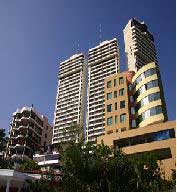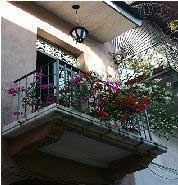Total transaction costs are low in Panama
How high are realtors' and lawyers' fees in Panama? What about other property purchase costs?
Transaction Costs |
||
| Who Pays? | ||
| Legal Fee | 2.00% | buyer |
| Registration Fee | 0.30% | buyer |
| Transfer Tax | 2% | seller |
| Real Estate Agent's Fee | 3.00% - 5.00% | seller |
| Costs paid by buyer | 2.30% | |
| Costs paid by seller | 5.00% - 7.00% | |
| ROUNDTRIP TRANSACTION COSTS | 7.30% - 9.30% | |
| See Footnotes Source: Global Property Guide |
||
How difficult is the property purchase process in Panama?
There are no restrictions on ownership of property by foreigners, except that article 121 of the Panamanian Tax Code says that foreign persons, or Panamanian corporations with foreign ownership, cannot purchase property located less than ten kilometers from the frontiers, nor on islands under the jurisdiction of Panama. Foreigners may engage in commerce or industry without limitations.
 Panama encourages long-term foreign investment and offers a retiree incentive program, the Pensionado program, which is not necessarily age-related and whose benefits are considerable such as tax exemptions and big discounts on utilities and basic services.
Panama encourages long-term foreign investment and offers a retiree incentive program, the Pensionado program, which is not necessarily age-related and whose benefits are considerable such as tax exemptions and big discounts on utilities and basic services.
It is advised that a good way to protect all rights as a foreigner to hold real estate is through the establishment of a Panamanian Corporation. This will protect you from frivolous legal proceedings or asset seizure in your home country and has advantages under Panamanian law as well. Constitutionally, the government cannot seize private property unless it follows a procedure similar to eminent domain in the U.S. The owner receives fair market value for land and improvements.
The two most common alternatives used by foreigners are (1) to ensure that the property purchased is already titled, and (2) to purchase a "possession right".
1. Titled Properties
The Public Registry Office (Registro Publico) keeps record of all titled properties in all nine provinces of Panama. Information regarding titled properties is readily available through the Public Registry, and thus it is fairly simple to undertake a preliminary due diligence.
The following are the steps necessary to successfully buy a titled property:
- Perform a complete due diligence of the property, including a complete title search, review of cadastral maps, verification of tax good standing of the land, verification of good standing in utility bills (water and sewage, electricity, telephone, etc.) as well as verification of any other special characteristic, limitation or encumbrance over the property.
- Enter into a Promise to Purchase Agreement to secure the property, which will give the buyer time to properly execute the due diligence, and to obtain financing. This agreement must be recorded in the Public Registry in order to affect third parties.
- When due diligence has been completed, enter into a Purchase and Sale Agreement. It is important to include an indemnification clause in the event of hidden defects of the property.
- Ownership is confirmed once the public deed containing an annotation regarding change of ownership is registered at the Public Registry Office.
- Generally, payment is not delivered to the seller, until transfer of ownership has been registered. But in some other cases the parties agree to appoint an escrow agent (lawyer or banker) to receive the funds under an escrow agreement, which states that payment will be made immediately upon presentation of the deed of transfer of ownership of the property, duly recorded at the Public Registry Office.
2. Possession Rights Properties
(Derecho Possessorio)
 Not all properties in Panama are subject to registry in the Public Registry Office. Many beach front properties, islands and real estate in special tourism zones such as Bocas del Toro and Portobelo are owned and managed by the national or local municipal governments, and only "possession rights" are granted over these lands for a determined period of time.
Not all properties in Panama are subject to registry in the Public Registry Office. Many beach front properties, islands and real estate in special tourism zones such as Bocas del Toro and Portobelo are owned and managed by the national or local municipal governments, and only "possession rights" are granted over these lands for a determined period of time.
Persons interested in investing in projects located in these restricted areas should be very careful to ensure that the award of the "possession right" or "limited ownership" is granted by the pertinent national or local municipal government authorities. It is important to verify the following:
- That the award of the piece of land has been issued by the correct authorities.
- That the award contains a complete description, including limits, boundaries, encumbrances, and other important details of the land. A complete blueprint should have been drawn and approved.
- That the activity to be undertaken by the purchaser is allowed, that is that the construction or building to be made is acceptable to the national or local government.
- That the award be extensive for a period of time suitable for the purchaser.
Due to the lack of uniformity regarding the granting entity for "possession rights," it is of utmost importance to review each purchase individually and make recommendations especially for each land option. The length of the transaction process for the possession rights transfer will vary, and can take up to 6 months.
Derecho Possessorio can refer to two situations:
- Government land occupied by peasants. After a length of time, the occupant can claim the occupied piece of land, and officially obtain the "right of use" for an indeterminate period (it has been known to pass from one generation to another.) This right can be sold.
- Unused idle private land occupied and worked by third parties for an extended period (at least 5 years), which can be claimed by the people who have worked the land. Establishing the Derecho Possessario is a legal process, that requires probes and witnesses. Conversely, owners must periodically inspect expanses of land, or people them with live stock or buildings, in order to establish proof of use, and to discourage claims against the owner.
 An important difference between a owning a Titled Property and a Rights to Possession is that a titled property can be mortgaged, whereas possession rights cannot.
An important difference between a owning a Titled Property and a Rights to Possession is that a titled property can be mortgaged, whereas possession rights cannot.
Be careful in dealing with Panamanian Real Estate Agents. Some agents have been known to ask 100% more for a property, without the owner knowing it. They then pocket the mark-up, plus their commission. When buying real estate through an agent, it is advisable to talk to the property owner. If the real estate agent refuses to allow this, best walk away from the deal.
The whole process of registering a property can take around 22 days to complete.
Footnotes to Transaction Costs Table
 The round trip transaction costs include all costs of buying and then re-selling a property - lawyers' fees, notaries' fees, registration fees, taxes, agents' fees, etc.
The round trip transaction costs include all costs of buying and then re-selling a property - lawyers' fees, notaries' fees, registration fees, taxes, agents' fees, etc.

 Transfer Tax
Transfer Tax
Transfer tax is levied at a flat rate of 2%. The tax base is the selling price of the property or the cadastral value of the property, whichever is higher.